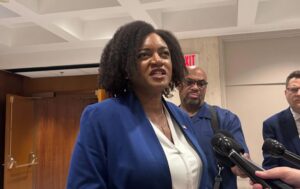
by Jackie Llanos, Florida Phoenix
Acknowledging the uncertainty of how profound the federal funding cuts could be and the possibility of a recession, Florida legislative leaders want to set aside $1.5 billion over the next two fiscal years.
As Florida lawmakers continue meetings this week in Tallahassee to pass a budget after the process fell apart earlier in the year, Senate President Ben Albritton and House Speaker Daniel Perez are touting the plan to bolster a $4.4 billion fund, called the Budget Stabilization Fund.
A dispute over the state budget, the only bill lawmakers must pass, caused the Legislature to extend the 60-day regular session, and lawmakers voted Thursday to extend their time to finish the budget until June 18. Although lawmakers agreed to spend $50 billion in general revenue the next fiscal year, they’re still working out the details of how that money will be spent.
The Legislature started advancing on Thursday a 2026 ballot amendment to increase the cap on how much money can sit in the BSF from 10% to 25% of revenue collections. At least 60% of voters will need to approve the proposed constitutional amendment, but lawmakers still plan to set aside $1.5 billion over the next two fiscal years in the meantime.
Anticipating the unexpected
Federal funding made up a third of the state budget last year, and Albritton told reporters Thursday that the state shouldn’t expect to receive the same level. His comments come as Congress considers hundreds of billions in cuts to Medicaid and food assistance over the next decade.
“Should we have the expectation that if the federal government is spending less to get their budget and their debt more under control, that we should be held harmless? I don’t think it works that way,” he said. “We’re the third-largest state in the country.”
Lawmakers want authorization to dip into the emergency reserves when revenue falls to the point that the BSF’s balance is more than 20% of net revenue going into the state’s primary general revenue fund to cover “critical state needs,” a term that hasn’t been defined. The last time the state withdrew money from the fund was during the Great Recession, according to a legislative analysis.
Meanwhile, Perez said the BSF serves as a way to prevent lawmakers from having to raise taxes in the future in case of a recession.
“None of us know what the future holds,” he said Thursday. “I think this is just a preparation of being prepared for the unexpected, and none of us know what the unexpected is, but we have a sample to look at in the 2000s when we had a recession. The state of Florida was not prepared for that recession.”
Regarding federal assistance during the Atlantic hurricane season, which started June 1, Perez said decisions at the state level would come as the federal government solidifies a plan. The federal fiscal year starts on Oct. 1.
“The federal government right now is somewhat of a moving target. I think we’re seeing decisions transpire in real time, not knowing all of the effects at the same moment. Us as a state, and I don’t just say us, I say that the Senate as well, will make decisions on how to deal with federal laws that are coming into play as they kind of come along,” he said.
Democrats view move as restricting future budgeting
But Democrats view the resolution to annually place $750 million aside in the BSF as tying the state’s hands to respond to economic downturns and current needs because accessing the fund is not as easy as spending money in the state’s normal reserves. Accessing the funds would take a two-thirds vote in each chamber.

House Democratic Leader Fentrice Driskell voted against the resolution to grow the BSF, saying the state needed to invest in stimulating the economy.
“You don’t get to talk about saving money for a rainy day when it’s still raining, and it’s already raining on the people in Florida,” she said.
Rich Templin, director of politics and public policy for the Florida AFL-CIO, likened the resolution to bolster the BSF to having to pay $1,000 rent and placing that money in a savings account instead.
“When we consider this joint resolution in the midst of this budgeting process that we are in, it seems that what we value is putting money into an account that may or may never be used as opposed to funding kids having access to healthcare, or education, or teacher salaries.”
Tax cuts and exemptions
Both Albritton and Perez say their plan to eliminate taxes on business rent, coupled with $350 million in permanent sales tax exemptions, will help Floridians save money. However, they haven’t reached an agreement on what items will be included in the sales tax exemptions and when.
Eliminating the tax for commercial leases, which is expected to cost $900 million, doesn’t translate to direct savings to the average person, but it would be good for the state as a whole, Albritton said.
“I’ll be the first one to say, of course, that doesn’t apply to everyone in every situation, but the fact of the matter is, nothing we do, nothing you do, is perfect, and nothing we do can be perfect for every single Floridian,” he said. “But in totality, when you are lowering what is a competitive disadvantage in Florida compared to other states, you’re doing good for Florida as a whole.”
Florida Phoenix is part of States Newsroom, a nonprofit news network supported by grants and a coalition of donors as a 501c(3) public charity. Florida Phoenix maintains editorial independence. Contact Editor Michael Moline for questions: info@floridaphoenix.com.
Disclaimer
The information contained in South Florida Reporter is for general information purposes only.
The South Florida Reporter assumes no responsibility for errors or omissions in the contents of the Service.
In no event shall the South Florida Reporter be liable for any special, direct, indirect, consequential, or incidental damages or any damages whatsoever, whether in an action of contract, negligence or other tort, arising out of or in connection with the use of the Service or the contents of the Service.
The Company reserves the right to make additions, deletions, or modifications to the contents of the Service at any time without prior notice.
The Company does not warrant that the Service is free of viruses or other harmful components












